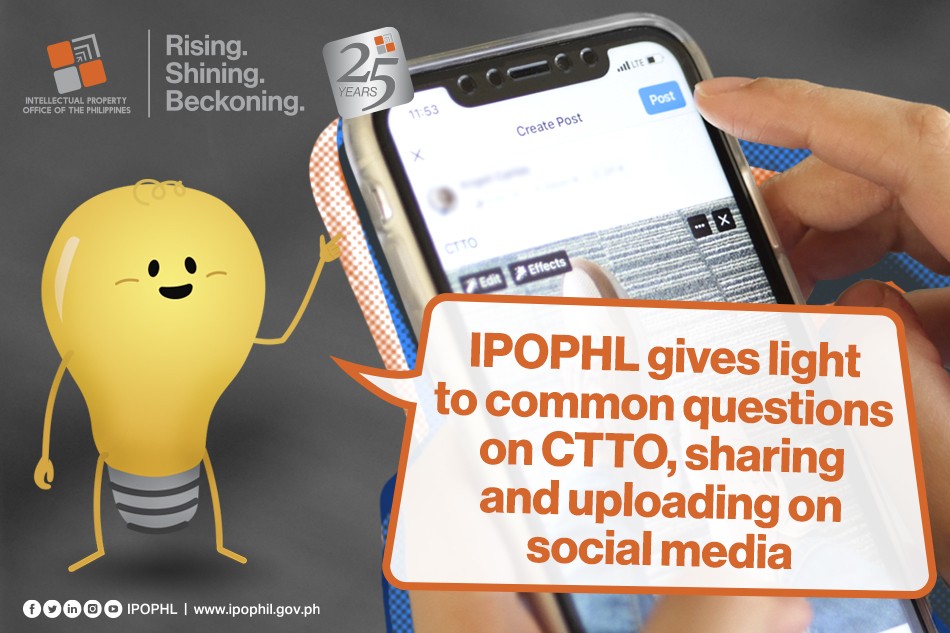
IPOPHL answers 8 most common questions on CTTO, sharing and uploading on social media
June 22, 2022
The internet has been abuzz over the discovery of the copyright infringing nature of using “Credits to the Owner (CTTO)” when creating or sharing content without permission from the original content creators.
As conversations have generated an abundance of interesting questions, the Intellectual Property Office of the Philippines decided to round up the most common ones it found and answered them.
1. What kinds of content posted on social media are copyrightable?
Sec. 172 of the Intellectual Property (IP) Code of 1997 enumerates a number of literary, artistic, scientific and scholarly works protectible under the IP Code.
In social media, the most common copyrightable works we consume or post are photographs, videos, graphics, literary works such as essays, poems and lyrics, and even memes.
Copyrighted works are generally protected throughout the lifetime of the author plus 50 years after death.
2. Is there a violation even if the photo shared without proper attribution isn’t registered with IPOPHL?
Yes! A copyrightable work automatically enjoys copyright protection the moment it is created.
3. What is the purpose of Facebook’s Share and Twitter’s Retweet buttons if sharing would be illegal?
Sharing posts or tweets per se is not illegal! It’s the content shared and the manner of sharing that could give rise to concerns.
In fact, using the Share and Retweet buttons are highly encouraged. After all, if the content owner sets a post to be viewable to the public, that should signify his intent to have his word and works out – but of course,with proper recognition, which could be achieved with the Share and Retweet buttons as these can show the author as the original source, therefore, the most likely creator of a post or tweet.
However, some still download photos or videos from their feeds and upload it to their own accounts to make it seem that the content is their own. Some also do the same with text-based content through copy-pasting instead of sharing or retweeting. Such acts could be forms of infringement.
4. Is CTTO violative even if there’s no commercial gain on the sharer or poster?
Yes, it is.
A copyright owner has two sets of rights: economic rights and moral rights. The scope of moral rights includes the right to attribution. So to be properly recognized as the author of a post, even without commercial gain, is an exclusive right every copyright holder could exercise.
5. Don’t those posted or published on the internet automatically become part of the public domain, which means we can consume and use them freely?
That everything on the internet is free is a common misconception. Creators can exercise the full breadth of their IP rights even in the online realm.
But once the protection term for a copyrighted work ends, the work enters the public domain which means it can be freely used.
Creators can also voluntarily waive their copyright by expressing this through clear language.
6. How about sharing inspirational quotes or memes? These kinds of content go viral so how can I trace the true content creator?
Sharing quotes alone does not constitute copyright infringement but uploading an entire book that is not yet in the public domain would.
The question will also depend on the photo background used. If the quote or meme was posted with a background of a photo which was stolen, then this constitutes infringement. If shared as a text alone or on the backdrop of a photo already in public domain, then this should be fine.
7. How do I determine if the publisher of the post is the original content creator? And if the publisher is not the content creator, how do I trace the author to give him or her proper recognition?
Because copies and shares are happening every second on social media, it is truly a difficult task to trace the creator of a content unless he or she is well-known. It may be prudent to treat all works as having copyright protection and, therefore, avoid sharing posts where you can’t be certain of who the true author is. If this tip seems hard to follow, given how sharing content has been a part of our everyday interaction online, you may always share at your own discretion and risk.
8. Can I go to jail for sharing or posting using CTTO and without proper attribution to the author?
You may or may not.
Going by the provisions of the IP Code, any person guilty of infringing, aiding or abetting copyright infringement is imprisoned for one to three years, plus a fine ranging from P50,000 to P150,000 for the first offense.
But you may not go to jail if the IP rights holder opts to have an out-of-court settlement or go through the more amicable track of mediation.
Ultimately it is up to rights holders to decide how to enforce their IP rights.







